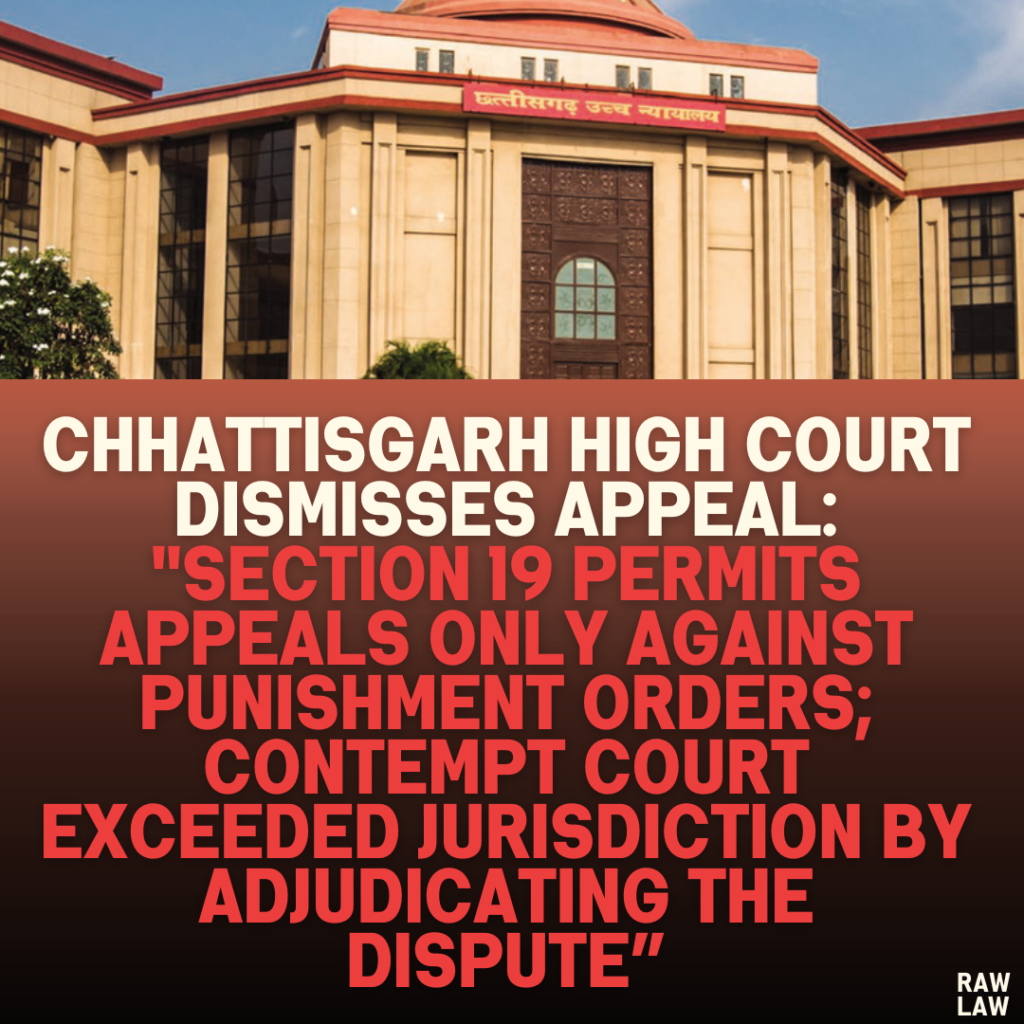Court’s Decision
The High Court of Chhattisgarh ruled that an appeal under Section 19 of the Contempt of Courts Act, 1971, can only be filed against an order imposing punishment for contempt. Since no punishment was imposed in the contempt proceedings, the appeal was deemed non-maintainable. The court granted the appellant liberty to challenge the contempt court’s order through an intra-court appeal, if allowed under the law.
Facts
- Initial Appointment of Substitute Sarpanch:
- The office of Sarpanch in Gram Panchayat Khapridih was reserved for a Scheduled Caste woman.
- Following the suspension of the elected Sarpanch due to an inquiry under Section 40 of the Chhattisgarh Panchayat Raj Adhiniyam, 1993, the appellant, who did not belong to the Scheduled Caste category, was appointed as a substitute Sarpanch under Section 39(3) of the Act.
- The respondent, a Scheduled Caste woman, alleged she was not served the required notice and was excluded from consideration for the position.
- Writ Petition and Subsequent Orders:
- The respondent filed a writ petition (WPC No. 1699 of 2024) challenging the appellant’s appointment. The writ court directed the Sub-Divisional Officer (Revenue) to re-examine the matter and take an appropriate decision within 60 days.
- Contempt Petition:
- Alleging non-compliance with the writ court’s order, the respondent filed a contempt petition (CONT No. 828 of 2024).
- The contempt court ordered the removal of the substitute Sarpanch (the appellant) and directed the initiation of proceedings for appointing the respondent as the substitute Sarpanch.
- Appeal Filed Under Section 19:
- The appellant challenged the contempt court’s directions, arguing that they exceeded the court’s jurisdiction and adversely affected her rights.
Issues
- Jurisdictional Overreach of the Contempt Court:
- Did the contempt court exceed its jurisdiction by issuing directions for removal and reappointment instead of focusing on compliance with the writ court’s order?
- Maintainability of Appeal Under Section 19:
- Can an appeal under Section 19 of the Contempt of Courts Act be entertained when no punishment for contempt has been imposed?
Petitioner’s Arguments
- Contempt Court Overreach:
- The contempt court issued fresh directions instead of ensuring compliance with the writ court’s earlier order. This exceeded its jurisdiction and prejudiced the appellant’s position.
- Contempt proceedings are meant to address non-compliance with court orders, not adjudicate substantive disputes or pass new directives.
- Appeal Maintainability:
- The directions of the contempt court, which resulted in the appellant’s removal as substitute Sarpanch, adversely impacted her legal rights and warranted appellate review under Section 19.
Respondent’s Arguments
- Non-Maintainability of the Appeal:
- Section 19 of the Contempt of Courts Act permits appeals only against orders imposing punishment for contempt. Since no punishment was imposed, the appeal was non-maintainable.
- Cited Midnapore Peoples’ Coop. Bank Ltd. v. Chunilal Nanda (2006) to emphasize the narrow scope of appealable orders in contempt proceedings.
- Alternative Remedies Available:
- The appellant was not without remedy and could pursue an intra-court appeal or other legal avenues, as the contempt court’s directions were not related to punishment for contempt.
Analysis of the Law
- Scope of Contempt Proceedings:
- Contempt proceedings are meant to ensure compliance with court orders and maintain the authority of the judiciary.
- The court emphasized that contempt courts should not delve into the merits of disputes or issue directions unrelated to compliance, as reiterated in Midnapore Peoples’ Coop. Bank Ltd. v. Chunilal Nanda.
- Maintainability of Appeal Under Section 19:
- Section 19 of the Contempt of Courts Act restricts appeals to cases where an order imposing punishment for contempt is passed.
- Directions unrelated to punishment for contempt, even if prejudicial to a party, do not fall under this provision, as clarified in Ajay Kumar Bhalla v. Prakash Kumar Dixit (2024).
Precedent Analysis
- Midnapore Peoples’ Coop. Bank Ltd. v. Chunilal Nanda (2006):
- Appeals under Section 19 are confined to punishment orders.
- Directions unrelated to punishment must be challenged through other legal remedies.
- Ajay Kumar Bhalla v. Prakash Kumar Dixit (2024):
- Reinforced that only orders punishing for contempt are appealable under Section 19.
Court’s Reasoning
- The contempt court issued directions for removal and reappointment without determining whether the writ court’s order had been complied with.
- These directions amounted to adjudication of the dispute, which is outside the scope of contempt proceedings.
- While the appellant was prejudiced by these directions, the appeal was not maintainable under Section 19 since no punishment for contempt had been imposed.
- The court cited Midnapore and Ajay Kumar Bhalla to emphasize that the appellant must pursue alternative remedies, such as an intra-court appeal.
Conclusion
The appeal was dismissed as non-maintainable under Section 19 of the Contempt of Courts Act. However, the court granted the appellant liberty to challenge the contempt court’s directions through an intra-court appeal, if available.
Implications
- This judgment reaffirms the limited scope of appeals under Section 19 and the principle that contempt courts should not adjudicate substantive disputes.
- It highlights the need for administrative and judicial authorities to strictly adhere to procedural safeguards in appointments under reserved categories.
- Parties adversely affected by directions in contempt proceedings must seek remedies through appropriate alternative legal channels.




Pingback: Karnataka High Court: Denying Opportunity to Present Evidence in Liquidation Proceedings Impedes Justice; Grants Opportunity to Adduce Evidence in Land Acquisition Case, Emphasizing Right to Compensation - Raw Law
Pingback: Kerala High Court Orders Removal of Attachment on Property After Dismissal of Suit for Default, Clarifying the Effect of Order 38 Rule 9 of CPC on Attachments Before Judgment - Raw Law